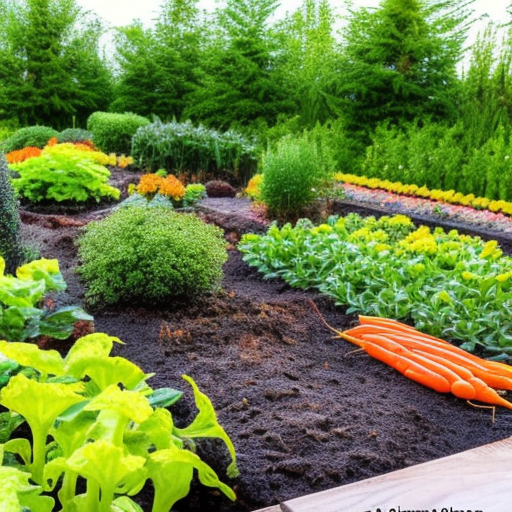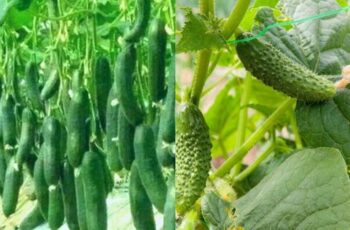Ad Blocker Detected
Our website is made possible by displaying online advertisements to our visitors. Please consider supporting us by disabling your ad blocker.
5 Plants to Never Grow Near Carrots & 10 Beneficial Companions

Carrots are delicate plant that requires special attention to produce healthy tubers. They are root crops that can be affected by pests that reside in the soil. Fortunately, there is a solution to this problem: companion planting.
By planting carrots alongside other vegetables, herbs, or flowers, you can reduce the risk of pests and improve the quality of your crop.
Carrots are best grown during spring and summer and can be eaten raw in salads or cooked with a variety of meals. They are highly nutritious and provide essential vitamins to the body.
The best way to protect this crop is by planting it with compatible companions, such as rosemary, chives, legumes, thyme, leeks, tomatoes, radish, brassicas, nasturtiums, and onions. Avoid planting carrots alongside potatoes, dill, celery, and parsnips, as these plants can hinder carrot growth.
Companion planting has numerous benefits. It improves the yield of your carrot crop, keeps pests at bay, and enhances the flavor of your carrots. Additionally, companion planting can help your carrots retain their vitamins, making them even more nutritious.
Incorporating carrots into your garden is an excellent idea, as they are versatile and delicious. Some companion plants will encourage carrot growth, making them an excellent choice for any garden. With proper care and attention, you can enjoy a bountiful harvest of nutritious and tasty carrots.
10 Best Carrot Companion Plants

Incorporating companion plants into your carrot garden can significantly increase your yield and promote a healthy harvest. Below, we’ve compiled a list of the top ten companion plants to grow alongside your carrots to maximize their potential.
1. Onions
Onions are versatile plants that can positively impact the growth and health of many other vegetables. While there are a few plants that may be negatively affected by onions, the benefits of growing onions alongside carrots are numerous.
Carrots are particularly fond of being planted near onions. Not only do onions help repel pests like carrot flies and aphids, but they also attract beneficial insects such as predators that feed on these pests.
For even stronger protection, consider planting onions alongside their cousins, chives, or garlic. This will encourage an even more robust defense system against pests and promote the health and vitality of your carrot crop.
By incorporating onions into your vegetable garden, you can create a mutually beneficial relationship that leads to a bountiful and healthy harvest.
Onion Seeds Product: here
2. Chives
Chives, a member of the allium family, are renowned for their ability to release a strong scent that deters harmful pests such as aphids. These pests can wreak havoc on crops like carrots, leading to a poor harvest.
By planting chives in close proximity to your carrots, you can effectively deter these pests and promote a healthy crop.In addition to pest control, chives can also provide some much-needed space for your carrot plants to grow. Furthermore, the subtle onion-like flavor of chives can also enhance the taste of your carrots, adding an extra layer of deliciousness to your dishes.
By incorporating chives into your vegetable garden, you can enjoy a natural and effective pest control solution, as well as a flavorful and healthy carrot harvest.
3. Leek
Leeks make excellent companions for carrots due to their ability to repel common enemies of carrots, such as carrot flies and moths. When planted together, leeks can help protect your carrot crop from these pests, resulting in a healthier and more abundant harvest.
In addition to their pest-repelling properties, leeks are also a great companion plant for carrots because they complement each other’s growth. Leeks grow tall and slim, leaving plenty of space for carrots to develop their tubers without competing for resources.
Overall, planting leeks alongside your carrots is a smart and practical solution for improving the health and productivity of your carrot crop. With this natural partnership, you can enjoy a bountiful and successful harvest.
4. Legumes
Cover crops are an essential element of any successful garden, and legumes are among the most valuable options available. In addition to helping gardeners cut costs on fertilizers, legumes can boost soil fertility and provide much-needed nutrients to their companion plants.
Carrots, in particular, are a nutrient-loving crop that can benefit greatly from the proximity of legumes such as beans and peas. These legumes have the unique ability to fix nitrogen in the soil, which is essential for promoting healthy growth in carrot plants.
By incorporating legumes into your garden, you can create a natural and effective solution for boosting soil fertility and promoting the growth of nutrient-loving crops like carrots. With this smart planting strategy, you can enjoy a thriving and productive garden with minimal effort and expense.
5. Rosemary
When it comes to selecting herbs to plant in your garden, rosemary is an excellent choice for a variety of reasons. This fragrant and flowering herb not only adds beauty and interest to your garden, but it also has natural pest-repelling properties that make it a valuable addition to any vegetable garden.
One of the benefits of planting rosemary near your vegetable crops, such as carrots, is its ability to keep pests at bay. The strong scent of rosemary acts as a natural deterrent to many pests, including aphids, which can be a major problem for carrot plants. By planting rosemary alongside your carrots, you can create a natural and effective solution for keeping these pests at bay and promoting the health and productivity of your crop.
6. Nasturtium
One example of a sacrificial plant that can be particularly effective in the garden is the nasturtium. This bright and colorful flower not only adds beauty and interest to your garden, but it also has natural pest-repelling properties that make it an excellent choice for protecting your vegetables.
When planted near carrots, nasturtiums act as a trap crop, attracting pests such as aphids and whiteflies away from the main crop and preventing them from causing damage. In addition, nasturtiums also invite beneficial insects such as ladybugs and lacewings to your garden, which can help control pest populations and promote the health and productivity of your crops.
Overall, adding sacrificial plants such as nasturtiums to your garden is a smart and natural way to protect your vegetables from pests and promote a healthy, thriving garden.
7. Tomatoes
Tomatoes are well-known for being vulnerable to pests and fungal diseases, but they don’t pose a threat to carrots. In fact, growing tomatoes near carrots can be beneficial. Tomato plants can provide shade for carrots, which need some protection from the sun. This means that you won’t have to resort to covering your carrot plants with plastic or other materials.
By planting tomatoes and carrots near each other, you can maximize the use of space in your garden and enjoy a bountiful harvest.
Great Tomato Seeds here
8. Radish
In order to have a successful carrot harvest, it is essential to have soil that is properly tilled and aerated. This is where radishes come in handy. As a natural soil aerator, radishes help to loosen up the soil, making it easier for the roots of the carrot to penetrate deeply into the ground.
By planting radishes near your carrots, you’ll ensure that the soil is well-aerated and conducive to the optimal growth of your carrot crop. Additionally, radishes are a quick-growing crop that can be harvested before the carrots reach maturity, allowing you to maximize the use of your garden space.
9. Brassicas
If you’re growing carrots and brassicas like cabbages or kales in your garden, planting them in close proximity can be beneficial. Carrots release a strong aroma that can mask the scent of your brassicas, deterring pests that would otherwise harm them. By growing these plants together, you can provide some much-needed protection to your cabbage and kale crops while still ensuring a healthy harvest of carrots.
10. Thyme
Thyme is a highly versatile herb and an excellent addition to any garden, especially as a companion plant. With its powerful scent, it can repel pests like carrot flies and psyllids, keeping your carrot crop safe and healthy. Not only does it offer pest protection, but it also adds a delightful flavor to your carrots. After harvesting your crop, you can incorporate thyme into your culinary dishes, enhancing their taste and aroma. Make sure to include thyme in your garden to enjoy its numerous benefits!

